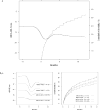Functional status after colon cancer surgery in elderly nursing home residents
- PMID: 22428583
- PMCID: PMC4497557
- DOI: 10.1111/j.1532-5415.2012.03915.x
Functional status after colon cancer surgery in elderly nursing home residents
Abstract
Objectives: To determine functional status and mortality rates after colon cancer surgery in older nursing home residents.
Design: Retrospective cohort study.
Setting: Nursing homes in the United States.
Participants: Six thousand eight hundred twenty-two nursing home residents aged 65 and older who underwent surgery for colon cancer in the United States between 1999 and 2005.
Measurements: Changes in functional status were assessed before and after surgery using the Minimum Data Set Activity of Daily Living (MDS-ADL) summary scale, a 28-point scale in which score increases as functional dependence increases. Regression techniques were used to identify patient characteristics associated with mortality and functional decline 1 year after surgery.
Results: On average, residents who underwent colectomy had a 3.9-point worsening in MDS-ADL score at 1 year. One year after surgery, rates of mortality and sustained functional decline were 53% and 24%, respectively. In multivariate analysis, older age (≥ 80 vs 65-69, adjusted relative risk (ARR) = 1.53, 95% confidence interval (CI) = 1.15-2.04, P < .001), readmission after surgical hospitalization (ARR = 1.15, 95% CI = 1.03-1.29, P = .02), surgical complications (ARR = 1.11, 95% CI = 1.02-1.21, P = .01), and functional decline before surgery (ARR = 1.21, 95% CI = 1.11-1.32, P < .001) were associated with functional decline at 1 year.
Conclusion: Mortality and sustained functional decline are common after colon cancer surgery in nursing home residents. Initiatives aimed at improving surgical outcomes are needed in this vulnerable population.
© 2012, Copyright the Authors Journal compilation © 2012, The American Geriatrics Society.
Conflict of interest statement
Figures
References
-
- O’Connell JB, Maggard MA, Ko CY. Cancer-directed surgery for localized disease: decreased use in the elderly. Ann Surg Oncol. 2004;11:951–2. - PubMed
-
- Fried TR, Bradley EH, Towle VR, et al. Understanding the treatment preferences of seriously ill patients. N Engl J Med. 2002;346:1061–6. - PubMed
-
- Lawrence VA, Hazuda HP, Cornell JE, et al. Functional independence after major abdominal surgery in the elderly. J Am Coll Surg. 2004;199:762–72. - PubMed
Publication types
MeSH terms
Grants and funding
LinkOut - more resources
Full Text Sources
Medical
Research Materials
Miscellaneous



